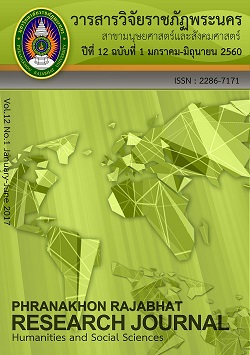พระพุทธศาสนากับการแก้ปัญหาทางนิเวศวิทยาอย่างยั่งยืน
Main Article Content
Abstract
บทความนี้มีวัตถุประสงค์เพื่อนำเสนอการแก้ปัญหาทางนิเวศวิทยาอย่างยั่งยืนด้วยทัศนะทางพระพุทธศาสนาเริ่มต้นด้วยการนำเสนอข้อเท็จจริงต่างๆได้แก่ ความหมายของนิเวศวิทยา(ecology) นำเสนอทัศนะเกี่ยวกับจิตวิญญาณเชิงนิเวศของนักปรัชญา นักนิเวศวิทยา และบุคคลที่โดดเด่นทางพระพุทธศาสนาทั้งใน และต่างประเทศ รวมถึงแนวคิดนิเวศวิทยาแนวลึก ทางอภิปรัชญาหรือจริยธรรมที่สร้างจุดยืนอยู่บนพื้นฐานของความรู้ทางนิเวศวิทยา และเน้นความสำคัญและให้คุณค่าต่อระบบนิเวศแบบองค์รวม ที่สอดคล้องและสนับสนุนแนวคิดนี้คือ ทฤษฎีกัยย่า (Gaia Theory) ซึ่งมองว่าโลกเป็นองค์รวมที่มีชีวิต มีการจัดระบบของตนเอง เพื่อการดำรงอยู่ของโลก นอกจากนี้ยังบ่งชี้ให้เห็นถึงปัญหาของนิเวศวิทยาที่เกิดขึ้นในปัจจุบัน จากนั้นวิเคราะห์ทางออกของปัญหาทางนิเวศวิทยา โดยนำเสนอแนวคิดด้านนิเวศของพระพุทธศาสนา นำไปสู่การประสานจิตวิญญาณเชิงนิเวศด้วยพระพุทธศาสนา นิเวศวิทยาแนวลึก และทฤษฎีกัยย่า ซึ่งกระบวนทัศน์แบบพระพุทธศาสนาจะช่วยปรับทิศทางความสัมพันธ์ระหว่างมนุษย์กับธรรมชาติ จากการที่มนุษย์แยกตัวเองออกจากธรรมชาติและเอาตัวมนุษย์เองเป็นศูนย์กลาง มาสู่ทัศนะที่ว่าสรรพสิ่งล้วนเชื่อมโยงอิงอาศัยซึ่งกันและกันเป็นองค์รวม
This article aims to offer a sustainable ecology problem solving through Buddhism. This approach starts with the presentation of the facts, such as the meaning of ecology, views on the ecospirituality of philosophers, ecologists, outstanding persons in Buddhism both at domestic and international level, including deep ecology concepts that are either metaphysics or ethics created on the basis of ecological knowledge. These emphasize the importance and value to the ecosystem holistically. The consistency and supporter of this approach is Gaia theory, which views the world as a holistic living having its own system organization for the existence of the world. In addition, it also points ecological problems occurring at the present time. Data are analyzed to find solutions of ecological problems by presenting Buddhist ecological concepts which contribute to the coordination of ecospirituality through Buddhism, deep ecology , and Gaia theory. This paradigm of Buddhism helps shape the relationship between humans and nature from having separated themselves from nature and become self-centered to viewing that all living things are holistically linked altogether.
Article Details
Each publish articles were copyright by Phranakorn Rajabhat University
Any contents which appeared in each articles in the journal were authors personal opinion. It did not relate to Phranakorn Rajabhat University and other instructors in the university. Each authors would take responsibility on their articles. If there are any mistake, the authors will take responsibility themselves


